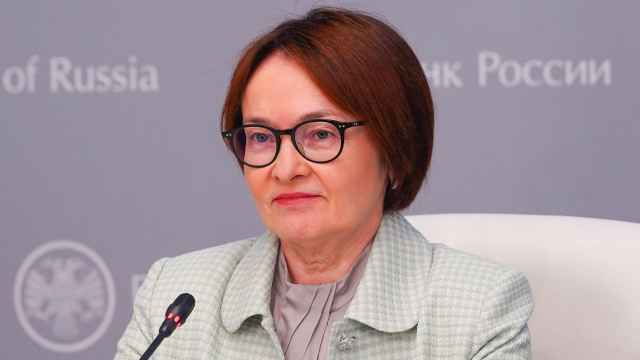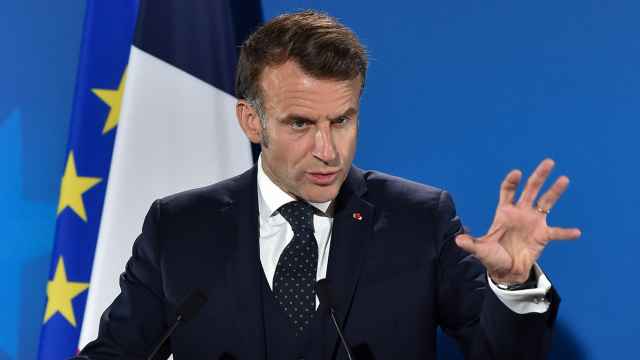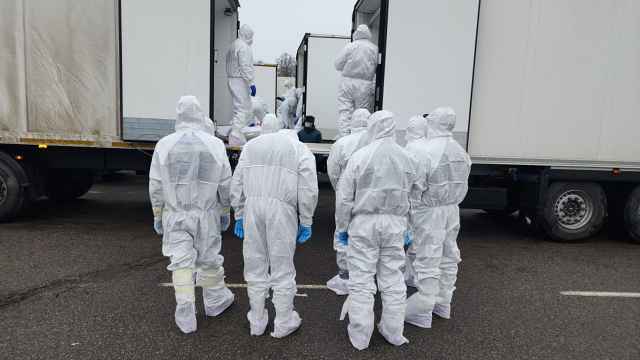ZHELEZNOVODSK — One weekday morning in a sanatorium of the Caucasian Mineral Waters resort cluster in the Stavropol region is like any other.
People in white bathrobes and slippers shuffle the hallways and patiently wait in line for their health appointments to start. People come to this area to soak in mineral baths and lounge in darkened rooms for hourlong psychorelaxation sessions.
Perhaps the only events that truly shake up such daily monotony are the whirlwind romances and acrimonious divorces that have been associated with the area since the century, when it was a favorite among ailing Moscow and St. Petersburg aristocracy.
Behind this calm facade, though, administrators of the sanatoriums and local officials are debating business tactics with zeal.
The year-round resort cluster is in an interesting dilemma. Although its existing sanatoriums are overloaded, private investors, particularly foreign ones, are still wary of throwing in their money.
"Investors don't go here. Those who aren't afraid are left to skim the cream off the top," said Maria Sizina, director of the hotel real estate department at AFI Development. The Israel-based group is currently the only foreign investor in the region.
The four key cities that make up the resort — Kislovodsk, Pyatigorsk, Yessentuki and Zheleznovodsk — specialize in healing the digestive, nervous and respiratory systems. Up to 750,000 people visit these cities each year in hopes of getting better from their mineral waters, mud baths and clean air.
The Department of Tourism and Resorts of the Stavropol region projects that the flow of tourists will double by 2025.
"Sochi can only dream of this," said regional tourism department director Valentina Chentsova. "They tell us how lucky we are."
The 132 sanatoriums in the cluster are already operating at 110 to 120 percent of their capacity during the peak season, which spans from July to October. The sanatorium staff has to bring out makeshift beds or put people on couches.
Private investors have little share of this market. Up to 40 existing sanatoriums are owned by various government bodies, including the Federal Security Bureau and the Interior Ministry.
The Federation of Independent Trade Unions owns 22 sanatoriums, and former Soviet republics, specifically Ukraine, Uzbekistan and Kazakhstan, own another seven facilities.
AFI Development, which also owns AFIMall City in the capital's Moskva-City business center and is controlled by Lev Leviev, is the only foreign investor in the area with two operational sanatoriums and one in planning stage. Foreign hotel operators are not represented in the cluster.
Ministry officials estimate that they need federal funding of about 180 billion rubles ($5.6 billion) to develop social, cultural and transportation infrastructure in the Caucasian Mineral Waters. The improvements would help to make the resort cluster more attractive to investors, but an even greater challenge may lie in the efforts to supply the area with service personnel and clean up its violence-tarnished image.
"We hear everywhere that the North Caucasus will be developed, and I hope that Stavropol region will not be forgotten," Sizina said. "I hope that all the money doesn't go to Krasnodar or Chechnya. I hope that we'll also get something."
Investment tug and pull
Valentina Chentsova remembers walking on the construction site of Plaza Spa in Kislovodsk ahead of its opening in 2005. Cement dust fell on her head as she walked through the debris, trying to decide how many stars the sanatorium would get.
Plaza Spa was a unique private investment project at the time, but the regional department of tourism has now identified several investment platforms with which it hopes private investors will launch new construction or reconstruction projects.
Some private investors have already shown interest in the area, including St. Petersburg-based Rostok and PetersburgKurortStroy as well as the North Caucasus Development Corporation. Overall, 50 sanatoriums are being built from scratch or being reconstructed on the basis of old Soviet facilities that used to work in the resort cluster.
Yet a lack of service personnel and the poor image of the Stavropol region are deterring other potential investors from seeking a chunk of its robust tourism flow.
There are 15 schools in Stavropol region that train students in hospitality, hotel management and related fields. But while there are plenty of managers to go around, the region is short of service personnel, such as maids, waiters and cooks.
"If we continue to graduate the same number of students from these schools as we do now, we will only cover the need for these specialists in 40 years," Chentsova said. "As for maids and medium-level personnel, such as waiters and others, we will meet our demand for them only in 100 years."
The Kislovodsk branch of the Moscow Academy of Tourist, Hotel and Restaurant Business graduated 75 students this year. Two of the female graduates went on maternity leave, and three of the male graduates were sent to the army. The remaining graduates are already working, said Nelli Pavlyukova, the branch's director.
Pavlyukova said she hides from phone calls from sanatorium directors because they ask her to give them new staff members.
"I don't have students who aren't working," Pavlyukova said. "I tell them, 'The only thing you can do is entice them [to go to your sanatorium].'"
The region's association with violence is another turnoff for private investors. Pyatigorsk is the center of the North Caucasus federal district, so violent incidents that happen in nearby Chechnya are inevitably discussed in the Stavropol region, Chentsova said.
"We want [other regions] to see that we don't have a war. We don't have problems. Nobody is shooting guns here," Chentsova said.
Chentsova said the region doesn't have the financial resources to use mass media to counteract this negative image, so local officials try to promote the region by participating in the less costly tourism exhibits that take place across Russia each year.
Cream of the crop
AFI Development sees opportunity in the roomy real estate market at Caucasian Mineral Waters.
The developer has six investment projects in the region, including two in Zheleznovodsk and four in Kislovodsk. The four-star resort in Kislovodsk is on the verge of recouping its investments.
The company also started work again on projects that were frozen after the 2008 financial crisis. The Plaza Spa at Zheleznovodsk, reconstructed from a Soviet-era sanatorium, welcomed its first guests a month ago.
The developer invested $40 million in the project with a $20 million credit from Sberbank and help in subsidies from the regional Economic Development Ministry.
"Commercial sanatoriums are considered to be risky projects," Sizina said. "We showed that it is interesting and risky but that the risk is worth it."
AFI Development is now getting ready to begin work on its second sanatorium in Kislovodsk. The aptly named Versailles is expected to be the first five-star facility at Caucasian Mineral Waters, with investments in the project figuring around $40 million.
The five-star niche is still open in the region, said Natalya Kholopova, first deputy director of tourism and resorts for the Stavropol region.
Muscovites are the main target audience for these resorts, Sizina said. Only 3 percent of the visitors who came to the region in 2011 were foreigners, and even then, most of them were residents of former Soviet republics, said Chentsova.
A Message from The Moscow Times:
Dear readers,
We are facing unprecedented challenges. Russia's Prosecutor General's Office has designated The Moscow Times as an "undesirable" organization, criminalizing our work and putting our staff at risk of prosecution. This follows our earlier unjust labeling as a "foreign agent."
These actions are direct attempts to silence independent journalism in Russia. The authorities claim our work "discredits the decisions of the Russian leadership." We see things differently: we strive to provide accurate, unbiased reporting on Russia.
We, the journalists of The Moscow Times, refuse to be silenced. But to continue our work, we need your help.
Your support, no matter how small, makes a world of difference. If you can, please support us monthly starting from just $2. It's quick to set up, and every contribution makes a significant impact.
By supporting The Moscow Times, you're defending open, independent journalism in the face of repression. Thank you for standing with us.
Remind me later.





